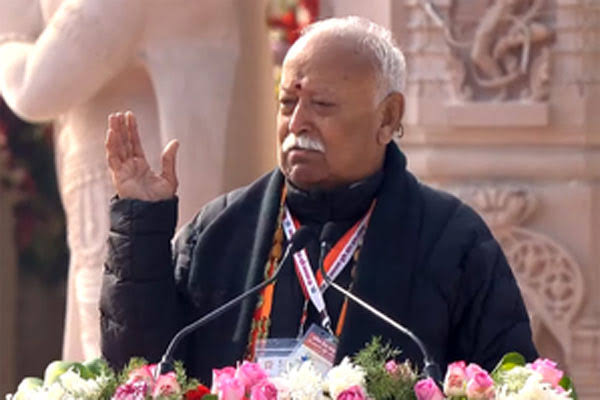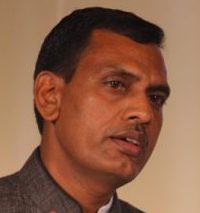What happened at Ayodhya on 22 January 2024 turned out to be a purely political event. Prime Minister Narendra Modi and RSS chief Mohan Bhagwat’s speech from the precincts of the temple after “infusing life” into a stone statue, validated the opposition’s charge that the function was political, not religious, and that it had two key ends – one, to build an atmosphere in the Bharatiya Janata Party (BJP)’s favour ahead of the Lok Sabha elections and two, to belittle the importance of the Republic Day.
The “pran-pratishtha” event unfolded along the expected lines, trampling on Constitutional propriety with impunity. But this didn’t happen for the first time. On 5 August 2020, the Prime Minister, throwing decorum and dignity of his high office to the winds, performed “bhoomi pujan” (land consecration) for the construction of the Ram temple in Ayodhya. It had become clear right then that notwithstanding the setting up of a trust for the construction of the temple, it would be a government project all the way. The contours of its inauguration had also become apparent. Mohan Bhagwat gave company to Modi at the bhoomi pujan event and he was by the Prime Minister’s side at the pran-pratishtha, too.
I was a member of the Rashtriya Swayamsevak Sangh (RSS) for five years – from my teens till I turned an adult. I served as a chief trainer, karyavah and district office chief. I had also joined the first karsewa at Ayodhya. While working with the RSS, I noted one thing about the organization – whether it was Ram, Krishna or any other deity, they were talked about only when there was a dispute, a controversy over them. Or when they talked about war or weapons or Ram Janmabhoomi or Krishna Janmabhoomi or Kashi Vishwanath Temple.
That was the time when the RSS and the Vishwa Hindu Parishad (VHP) had wrested control of the Ram Janmabhoomi issue and had fuelled a countrywide debate on it. That was the time when the locks on the Babri Masjid were opened, the foundation stone for the temple laid, Ram Shilas taken from door to door and Ram Rathyatra meandered through the country. I was also a witness to the first karsewa.

That was the time when the entire country was in ferment over Ram. The atmosphere was quite intimidating and Ram Janmabhoomi was the universal topic of discussion. Every other day, events focused on the issue were held. But even at the time, I never saw Ram’s picture in any office of the RSS or at any of their training sessions or gatherings. And neither did I see Ram’s puja being performed.
The RSS offices had pictures of Bharat Mata, Maharana Pratap, Shivaji Maharaj, K.B. Hedgewar and Guru Golwalkar. Also, there were books on Ram and Krishna, but only those that addressed the controversies surrounding them. I don’t remember being witness to any event venerating Ram or inspired by devotion for him.
For the Hindutvavadis, Ram was a handy tool then, and he is a handy tool now. It is apparent to me that they want to use and exploit the name of Ram to the hilt. They played gimmicks on the pretext of religion, faith and religious symbols then. They are doing the same now.
We need to understand the working of the RSS. Manu’s code and Hindu Rashtra are the things that matter for the RSS. It believes in hegemony. And Hindu gods and goddesses – whether Ram, Krishna or Shiva – are nothing more than tools for them. It worships these deities only for political gains. One cannot forget that just before the last elections in Uttar Pradesh, Shiva was brought into the picture. A corridor was built in his name and events were organized. The same was done in Ujjain in Madhya Pradesh – again before the recent elections in the state.
There is no doubt that our society loves festivals. These festivals often have religious underpinnings. But at the same, it is also true that ideological battles have been going on here. These have a long history. The tradition began with Buddha who challenged the basic tenets of Hinduism and negated the concepts of Varna and caste. Passing through Kabir and Raidas, this tradition reached Phule and Ambedkar, who challenged Varna-based hegemony. The domination of the upper castes continued to be challenged after Independence. The culmination of the struggle came on 14 October 1956, when Ambedkar quit Hinduism and embraced Buddhism.
The narrative being built is that the “pran-pratishtha” event marks key steps towards a decisive victory of Brahmanism. There is no doubt that efforts are underway to undermine the democratic India – an India based on the values of justice, liberty, equality, fraternity – so much so that an elected prime minister is behaving like an emperor on the one hand and is being described as a Rajshri and a high-minded ascetic, on the other hand. He is being conferred with the titles of Mahatma, Sant, Sadhu and Baba.
In the history of India’s democracy, 22 January 2024 will be remembered as a dark day – as dark as 6 December 1992, when, at the behest of the RSS, the Babri Masjid was pulled down by the karsewaks. On the pran-pratishtha day, too, those at the helm of power, sidestepped the constitution and abdicated their constitutional responsibilities.
(Translated from the original Hindi by Amrish Herdenia)
Forward Press also publishes books on Bahujan issues. Forward Press Books sheds light on the widespread problems as well as the finer aspects of Bahujan (Dalit, OBC, Adivasi, Nomadic, Pasmanda) society, culture, literature and politics. Contact us for a list of FP Books’ titles and to order. Mobile: +917827427311, Email: info@forwardmagazine.in)





